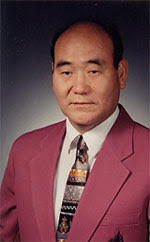Retired martial arts instructor inducted into hall of fame

Yong Chin Pak will recieve the Outstanding Leadership Award from the Grandmaster Society.
March 27, 2015
After teaching more than 35,000 students martial arts during his 40-year tenure at Iowa State, Grandmaster Yong Chin Pak will be inducted into the U.S. Taekwondo Grandmaster Society’s Hall of Fame.
Pak will be inducted into the hall of fame this April in Los Angeles, being awarded the Outstanding Leadership Award along with eight other people.
Pak said he was surprised to learn he was being awarded, as most inductees to the Hall of fame are in their 70s or older, yet he will just be turning 67 this year.
“He’s getting this recognition because he’s made considerable contributions as a teacher, practitioner and as a leader and contributor to the martial arts,” said Philip Martin, professor and chair of kinesiology. “I think it’s well deserved.”
Pak has been recognized both nationally and internationally for his work in the martial arts, including being named one of the 150 most influential leaders in taekwondo worldwide in 2009, an honor given to him by the South Korean government.
He also served as the president of the National Collegiate Taekwondo Association for 21 years.
Pak provided martial arts instruction for students during the daytime for credit, but also during the evening as part of the extra curricular martial arts club during his time at Iowa State. Pak began teaching at Iowa State in 1973 and retired in 2013. He has since moved to California.
Pak holds an eighth-degree black belt in taekwondo, a sixth-degree black belt in judo and an eighth-degree black belt in hapkido.
“There is a physical part, but martial arts teaches students to also have a better life, better learning and better citizenship,” Pak said.
Matt Hamann, kinesiology lecturer and current martial arts instructor, said he agrees that for Pak and his students, martial arts is much more than physicality.
“I’ve known him since I was nine years old,” Hamann said. “You can go anywhere and learn martial arts, but what sets him apart is that its not just about kicking and punching, it’s about learning respect. He talks about having respect for each other and the community. He’s always trying to build people up from the inside. If they can be a grand champion of something, that’s great, but he’s more concerned about just being successful in everyday life.”
Both Hamann and Philip said one of the first things that comes to mind when they think of Pak is his respectful nature.
“One of the things that he did every year was he invited our local retirees to a dinner,” Martin said. “It was part of what he thought was important in terms of being respectful to those who have helped to support him and his career as well as those who have preceded him.”
Hamann began working with Pak in 2009, every week for six days a week. During that time, Hamann worked as Pak’s protégé and eventually took over his position when Pak retired.
“Over the breaks, like Thanksgiving or Winter Break, he would always say to go home, gain five pounds, but make sure you’re always doing the dishes or you taking your mom and dad on a walk,” Hamann said. “He’s always talking about giving back and making yourself a better person.”
Hamann said that filling the shoes of someone like Pak has been stressful, but also rewarding.
“It’s amazing to see students who have low self-confidence or maybe have never done a physical activity like this before and being able to see them from the beginning of the semester to the end of the semester,” Hamann said. “It’s exciting to see people grow socially, physically and cognitively.”
In addition to being respectful, Pak is humble when it comes to his own accomplishments, is quick to boast about his students’ achievements and is very proud of the things they have accomplished, Hamann said.
Martin said the annual martial arts banquet is full each year with upward of 300 to 500 current and past students who come back to see Grandmaster Pak.
Many of Pak’s students have gone on to their own taekwondo programs in their own communities.
“He’s always been a wonderful leader,” Hamann said. “For him, it’s always been about his students. He always made sure his students were safe, comfortable and that they were learning.”
Pak said he greatly appreciates the recognition, but believes he wouldn’t have been able to accomplish it without the help of Iowa State and the Department of Kinesiology.
“He is always a breath of fresh air,” Martin said. “He’s a delightful person and a very pleasant individual. He really valued the role he played in helping students choose their paths in lives. I think it was just as important to him to help people with a set of principles by which to live their lives as it was to teach martial arts skills.”






